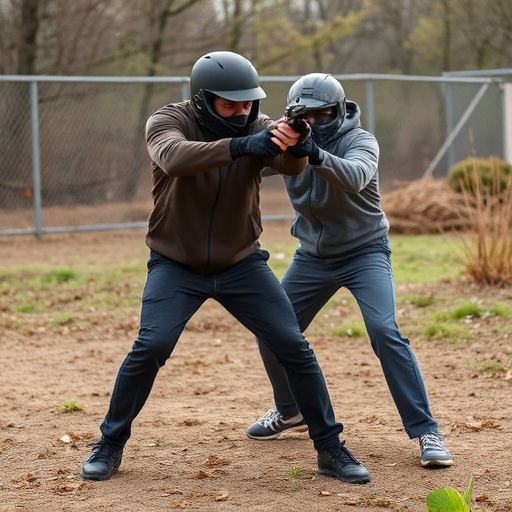Rechargeable stun gun batteries are essential for legal non-lethal self-defense weapons, offering cost and eco-friendly benefits over disposable alternatives. Voltage and capacity are key factors determining power, runtime, and safety. Compatibility with charging options and charge cycles ensure reliability. Understanding local laws and battery specifications is vital for effective threat deterrence without causing excessive harm.
“Exploring the heart of non-lethal self-defense tools, this article delves into the critical component often overlooked: rechargeable stun gun batteries. As the use of legal, non-lethal weapons gains traction, understanding battery specifications becomes paramount for optimal performance and safety. We’ll guide you through the intricacies, covering everything from the legal considerations surrounding these devices to the key battery metrics that dictate their effectiveness. Get ready to unravel the secrets behind these powerful yet legal self-defense tools.”
- Understanding Rechargeable Stun Gun Batteries
- Legal Considerations for Non-lethal Self-Defense Weapons
- Key Battery Specifications and Their Impact on Performance
Understanding Rechargeable Stun Gun Batteries

Rechargeable stun gun batteries are a key component in ensuring the reliability and longevity of non-lethal self-defense weapons that are legal in many jurisdictions. Unlike traditional disposable batteries, these power sources can be recharged multiple times, making them an eco-friendly and cost-effective option for those who rely on stun guns as a means of personal protection. Understanding the specifications of rechargeable stun gun batteries is essential to ensure optimal performance and safety.
The most important factor when considering rechargeable stun gun batteries is voltage and capacity. Voltage determines the power output, while capacity measures how long the battery can sustain that power before needing to recharge. Higher voltage offers more shock intensity, crucial for effective non-lethal self-defense, while higher capacity ensures longer use between charges, ideal for those in constant need of protection. Additionally, looking out for compatible charging options and the number of charge cycles the batteries support is vital to maintain a robust and reliable defense mechanism.
Legal Considerations for Non-lethal Self-Defense Weapons

The legality of non-lethal self-defense weapons, such as stun guns, varies across jurisdictions worldwide. It’s crucial to understand local laws and regulations before purchasing or carrying any such device. Many countries have specific restrictions on the type of force that can be used for self-defense, with a preference for options that minimize harm and avoid lethal consequences.
Non-lethal self-defense weapons that are legal in certain regions often come with guidelines regarding their use. These may include requirements for proper training, registration, or permits. Users must also be aware of the power output and range limitations set by regulations to ensure they can effectively deter threats without causing excessive harm or permanent disability.
Key Battery Specifications and Their Impact on Performance

When considering a rechargeable stun gun, understanding the battery specifications is crucial for choosing a reliable and effective non-lethal self-defense weapon that is legal in your region. The battery plays a significant role in determining the device’s performance, including its shock intensity, runtime, and overall usability.
Key battery parameters such as voltage, capacity (measured in mAh), and charging time directly impact the stun gun’s ability to deliver powerful shocks consistently. Higher voltage typically translates to more intense jolts, while higher capacity batteries offer longer continuous use between charges. Efficient charging times are also essential for users who need their devices readily available when needed. These specifications collectively ensure that your non-lethal self-defense weapon remains a dependable and effective option for personal safety.
Rechargeable stun gun batteries are a game-changer in the world of non-lethal self-defense weapons, offering both convenience and cost savings. Understanding the battery specifications is crucial when choosing a stun device, as it directly impacts performance and reliability. With proper knowledge and legal considerations, individuals can leverage these devices for personal safety without compromising on quality or legality.
